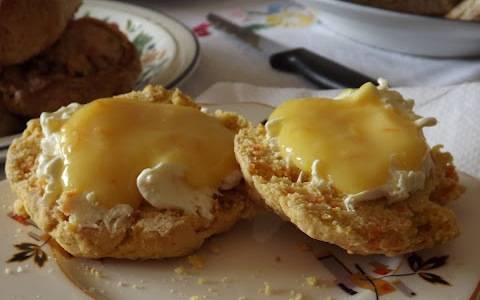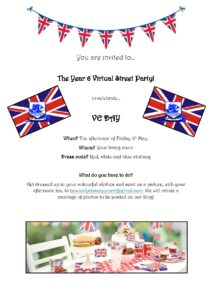Week beginning 4th May 2020 – Year 6 home learning

Welcome to VE Week!
[dropshadowbox align=”none” effect=”lifted-both” width=”auto” height=”” background_color=”#a0d3fe” border_width=”10″ border_color=”#f91414″ ]To celebrate VE Day (on Friday 8th May) we have decided to theme this week’s around the 75th anniversary of Victory in Europe Day that marked the end of World War II, and was the day on which allied forces announced the surrender of Germany in Europe. [/dropshadowbox]
From VEDay75.org:
When VE Day dawns on 8th May 2020 it will be 75 years since the guns fell silent at the end of the war in Europe. Years of carnage and destruction had come to an end and millions of people took to the streets and pubs to celebrate peace, mourn their loved – ones and to hope for the future, but not forgetting those still in conflict until 15th August when it was announced that Japan had surrendered unconditionally to the Allies, effectively ending World War II.
The 75th anniversary will provide our nation, and our friends around the world, with an opportunity to reflect on the enormous sacrifice, courage and determination of people from all walks of life who saw us through this dark and terrifying period. To commemorate this important time we are organising VE Day 75, a three-day international celebration that will take place from 8th May to 10th May 2020.
Home learning activities
English –
Day 1 – Write your own victory speech (listen to Winston Churchill’s speech he made on Victory in Europe Day in 1945).
Day 2 – Create a biography about Captain Tom Moore – a 100 year old war veteran who has recently raised an incredibly amount of money. Use the subheadings:
- Early life and family
- Military service
- Fundraising
- Awards and achievements
Day 3 – Diary entry as a British soldier who has learned about Germany surrendering.
Day 4 – Write a newspaper report about Victory in Europe Day, set in 1945.
Day 5 – Instruction writing: How to throw the perfect VE Day Street party.
Maths
Have a look at the planning to see what you are doing day-by-day:
Day 1 – Rationing
Day 2 – Rationing
Day 3 – Little ship mission
Day 4 – Buying clothes
WW2-maths-catalog ww2-maths-questions-easy ww2-maths-questions-harder
Day 5 – Codebreaker
Written Calculation Methods Code Breaker – LA
Written Calculation Methods Code Breaker – HA
Written Calculation Methods Code Breaker – MA
Mental Calculations Code Breaker – MA
Mental Calculations Code Breaker – LA
Mental Calculations Code Breaker – HA
History
Create a leaflet or poster all about VE Day. You could include:
- When it is?
- Any traditions?
- Why we celebrate it?
- What’s different this year?
- Any key individuals
Music
We would like to try to create a ‘feelgood’ video of our Year 6s! We were thinking about how we could tie this into our VE Day celebrations, in line with what’s going on at the moment. We would like the children to film themselves lip syncing along to the lyrics of Vera Lynn’s we’ll meet again (in the video above). Please send your video clips to howardprimaryyear6@gmail.com to take part. This video submission will also act as permission to publish on our Howard Primary School website.

Design Technology
Task 1 – Create your own Union Jack Bunting

How To Make Flag Bunting
Print them off and cut along the outside of the flags, making sure to include the tabs. Get the kids to colour in (or if you’re in a rush you can use our ready-coloured set), cut a piece of string or ribbon to the length you want, fold the tabs around the string and stick the tabs down with glue or tape. Then hang up for all to see!
Print Off Your Colour Union Jack Bunting Here
Print Off Your Union Jack Bunting To Colour In Here
Task 2 – Create a wartime dish

Over the year, we have looked at many of the struggles that the people of Britain had when it came to rationing. This week, we would like you to create a dish that would have been found during the war years. Please send any pictures of your amazing creations to our Class Dojo!
Find some thrifty wartime dishes here
Task 3 – Build your own Spitfire!
The Spitfire is, without a doubt, one of the most iconic planes that were seen during World War Two. Below, are some fun activities – of various difficulties – to create your own at home!

PE –
During World War 2, dance halls became very popular. Lindy hop was a fusion of many dances that preceded it or were popular during its development but is mainly based on jazz, tap, breakaway and Charleston. The Lindy hop became popular as it was introduced as a result of the American soldiers travelling over to Britain. Why don’t you have a go at practising some of the basic steps?

